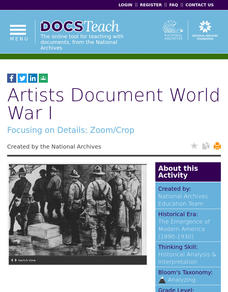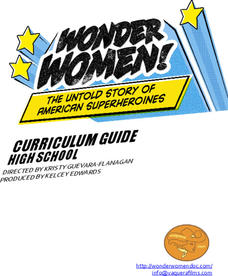Smithsonian Institution
A Dream Deferred: DACA
"Give us your tired, your poor, your huddled masses" has even more meaning for some children. The resource explores the Deferred Action for Childhood Arrivals (DACA) program. Scholars analyze primary sources and participate in...
Smithsonian Institution
Racism and Removal: Japanese Incarceration During World War II
During World War II people saw how far the government's control would go, but it was at the expense of its citizens. The resource brings the conditions of Japanese American internment camps to light using primary documents. Scholars...
Smithsonian Institution
Separate is Not Equal: Fight for Desegregation
Separate is not equal! An eye-opening instructional activity delves into the past to understand the fight for desegregation and how it impacted African American communities. Academics complete two one-hour lessons using documents,...
Smithsonian Institution
Borders with the World: Mexican-American War and U.S. Southern Borderlands
The Mexican-American War created social borders—not just physical ones. Scholars learn about the effects of the Mexican-American War on the people living in the borderlands using text excerpts, maps, and partnered activities. Academics...
DocsTeach
Environmental Case Study: Hetch Hetchy Valley
What is more important: building a new school or preserving a nature reserve? Keeping a natural area clean or providing clean drinking water to a city of millions? Young scholars weigh these questions—almost literally—using an...
DocsTeach
Chinese Exclusion Broadside Analysis
Racism against Asian American goes deep in American history. Using a broadside in favor of the Chinese Exclusion Act, class members examine clues—with key portions of the document blacked out—to better understand the roots of anti-Asian...
DocsTeach
Before and After Carlisle School
White reformers thought they were "killing the Indian" to "save the man." Native children were taken from their parents and placed at boarding schools, such as the Carlisle School. Using a comparative photo analysis of children before...
DocsTeach
Baseball on the World War I Homefront
Are sports essential to American life? Young historians ponder the question as they examine letters between the owner of the Boston Red Sox and Navy Secretary Franklin D. Roosevelt during World War I. The owner wanted two star players...
DocsTeach
Artists Document World War I
Drawings may be worth even more than a thousand words. Curious scholars query an artist's rendering of troops leaving a ship after they have arrived in Europe to fight in World War I. By zooming in and looking at the entire piece, class...
DocsTeach
President Reagan and the Cold War: Vision and Diplomacy
After years of boiling tension, the presidency of Ronald Regan and the rise of Mikhail Gorbechev paved a new way forward for diplomacy between the United States and the Soviet Union. Using primary source documents, including letters...
DocsTeach
Landing a Man on the Moon: President Nixon and the Apollo Program
Take the small step for man and giant leap for mankind with the Apollo astronauts using primary sources. Young historians explore the documents related to the American space program up through the lunar landing, including presidential...
DocsTeach
Analyzing Woodrow Wilson's Fourteen Points
The end of a war means the causes were resolved, right? Not for World War I. By examining Woodrow Wilson's Fourteen Points, budding historians consider imperialism, nationalism, militarism, and alliances, as well as Wilson's efforts to...
DocsTeach
Nixon Visits China: The Week that Changed the World
Sometimes one trip shakes up the entire world. When President Richard Nixon traveled to China, he defied international and political boundaries. Nixon was the first American president to visit mainland China, which was a communist nation...
Angel Island Immigration Station Foundation
How Do Pictures Tell the Story of Angel Island?
Young historians learn more about the history of Angel Island Immigration Station through their analysis of primary source images. Guided by a list of inferential questions, scholars learn how to make and record observations on a...
Angel Island Immigration Station Foundation
The Chinese Exclusion Act
As part of a study of Angel Island Immigration Station, young historians examine the Chinese Exclusion Act of 1882, the first restriction on the United States immigration based on race and nationality. They complete a matrix identifying...
Vaquera Films
Wonder Women - The Untold Story of American Superheroines: High School Curriculum Guide
A 41-page curriculum guide tells the story of the untold stories of American Superheroines! Divided into three modules, the guide is designed to be used before, during, and after viewing the 2012 documentary Wonder Women! The Untold...
C-SPAN
The Equal Rights Amendment (ERA)
The United States is built on the presumption of equality—yet we have not passed the Equal Rights Amendment to the Constitution. Using video clips featuring historians, a museum tour, and an interview with Ruth Bader Ginsberg, learners...
C-SPAN
Landmark Supreme Court Case: Roe v Wade
Perhaps no issue is as controversial than abortion in the American landscape. Go beyond the rhetoric by examining the Supreme Court case that legalized abortion in the United States. A guided note-taking activity unpacks the arguments...
C-SPAN
Jane Addams and John Dewey
Imagine living where there was eight inches of garbage on the street! These were the situations the Progressive movement sought to reform. Using video clips about John Dewey and Jane Addams, learners consider the philosophies and impact...
National Woman's History Museum
Fannie Lou Hamer and Social Activism
Not all heroes wear capes. An impactful activity focuses on the life and activism of Fannie Lou Hamer during the civil rights movement. Scholars read her speeches and other material, participate in group discussion, and complete a jigsaw...
C-SPAN
Women's Suffrage and the 19th Amendment
The right to vote was hard-won after decades of organizing by women and their allies. Using a series of video clips featuring women's historians, class members consider the efforts behind the Nineteenth Amendment. Possible extension...
Digital Public Library of America
Fannie Lou Hamer and the Civil Rights Movement in Rural Mississippi
Good primary resources, offering different perspectives on important issues and events, are hard to find. A packet of 12 primary source images, videos, audio recordings, records, and newspaper articles related to the 1960s civil rights...
National Woman's History Museum
Eleanor Roosevelt: An Agent of Social Change
First ladies often take a back seat to their husbands' policies, but Eleanor Roosevelt broke that mold. Interested historians examine primary sources written by Roosevelt, including a speech and articles. Completing a round-robin of...
National Woman's History Museum
Defying Expectations: Unsung Hero: Marsha P. Johnson and the Stonewall Riots
The 1960s were a turbulent time, but the charismatic figure of Marshal P. Johnson is often left out of the provocative stories of the era. With primary sources that talk about Johnson and her role in the Stonewall Riots, scholars unpack...

























